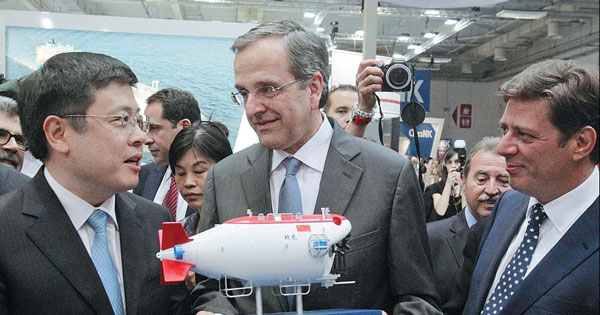
Rising tide of Sino-Greek trade
Comments Print Mail Large Medium Small
|
Chinese ambassador to Greece Zou Xiaoli (left) presents a model of the deep-sea submersible Jiaolong to Greek Prime Minister Antonis Samaras (middle) at an exhibition in Athens. Both nations are heavily involved in maritime businesses. Xinhua |
Bilateral trade between China and Greece is showing stronger signs of recovery with double-digit growth in the first quarter.
Statistics from the Ministry of Commerce show trade volume between the two countries was nearly $1.37 billion in the period, a sharp rise of 19.4 percent year-on-year.
It was the first increase since the onset of the European debt crisis in 2011.
"Trade will continue to grow thanks to efforts of entrepreneurs from both countries," said Sun Yongfu, head of the ministry's division of European affairs.
The Chinese government is encouraging companies to go global as they now have some advantages in technology and capital.
For its part, the Greek administration is stepping up efforts to build an export-oriented, investment friendly economy.
Despite its large deficit in commodity trade with China, Greece is narrowing the gap with the help of the service sector, said Sun.
One example is Greek companies generating at least $2 billion in revenues each year by shipping some 60 percent of China's crude oil and other bulk cargo, according to a report from the ministry.
Maritime shipping is one of Greece's most competitive sectors. By the end of April, the country had 4,894 ships with a combined capacity of 170 million tons, some 17 percent of the global total.
Sun said the sector offers great opportunities, especially in shipbuilding, shipping-related finance and port development.
In 2013, Greece ordered 165 ships from China while China's Cosco Group has helped turn Piraeus into one of the largest ports worldwide.
It handled 2.52 million containers in 2013, a 20 percent rise from the previous year.
Sun said the two sides have also raised a $1.6 billion fund to boost cooperation in the sector. The fund is a result of former premier Wen Jiabo's visit to the country in 2010.
Greece is also expected to attract more Chinese visitors as the country gives more priority to tourism, said Sun.
It had 1.8 million overseas visitors in 2013, just 28,000 of them Chinese despite the fact that China overtook the US as the world's largest source of overseas travelers. Greece is giving more efforts to tourism as it is seen as an industry that will help pull it out of the debt crisis, said Sun.
He added that movies featuring Greece's scenery and culture also help attract Chinese visitors.
Agricultural produce is also likely to find a niche in the Chinese market as the Greek government and companies are stepping up efforts to export their signature products to China, said Sun.
Greece is a famed producer of olive oil, cheese, honey and wine, he added.
Abundant sunshine has endowed the country with rich solar power and the Greek government has also promulgated some favorable policies to boost the development of clean energy.
Sun said the industry offers great potential as China is the largest producer of photovoltaic equipment and the second largest wind power market in the world.
Chinese companies already export solar panels to the country and have been making inroads into the market of power plant financing and construction since 2011, said Sun.
They are also scaling up investment in other industries. Telecom equipment manufacturer Huawei has built a logistics center in Greece and another giant in the telecom industry, ZTE, is following suit.
Both are headquartered in Shenzhen, Guangdong province.
In addition to investment, Chinese companies are involved in Greece's privatization initiatives, including the Piraeus port administration, the Athens international airport and the Greek power company.
"So we have every reason to believe that economic cooperation will play an important role in helping Greece find its way out of the predicament and rejuvenate its economy," said Sun.
The author is head of the Department of European Affairs, Ministry of Commerce.





